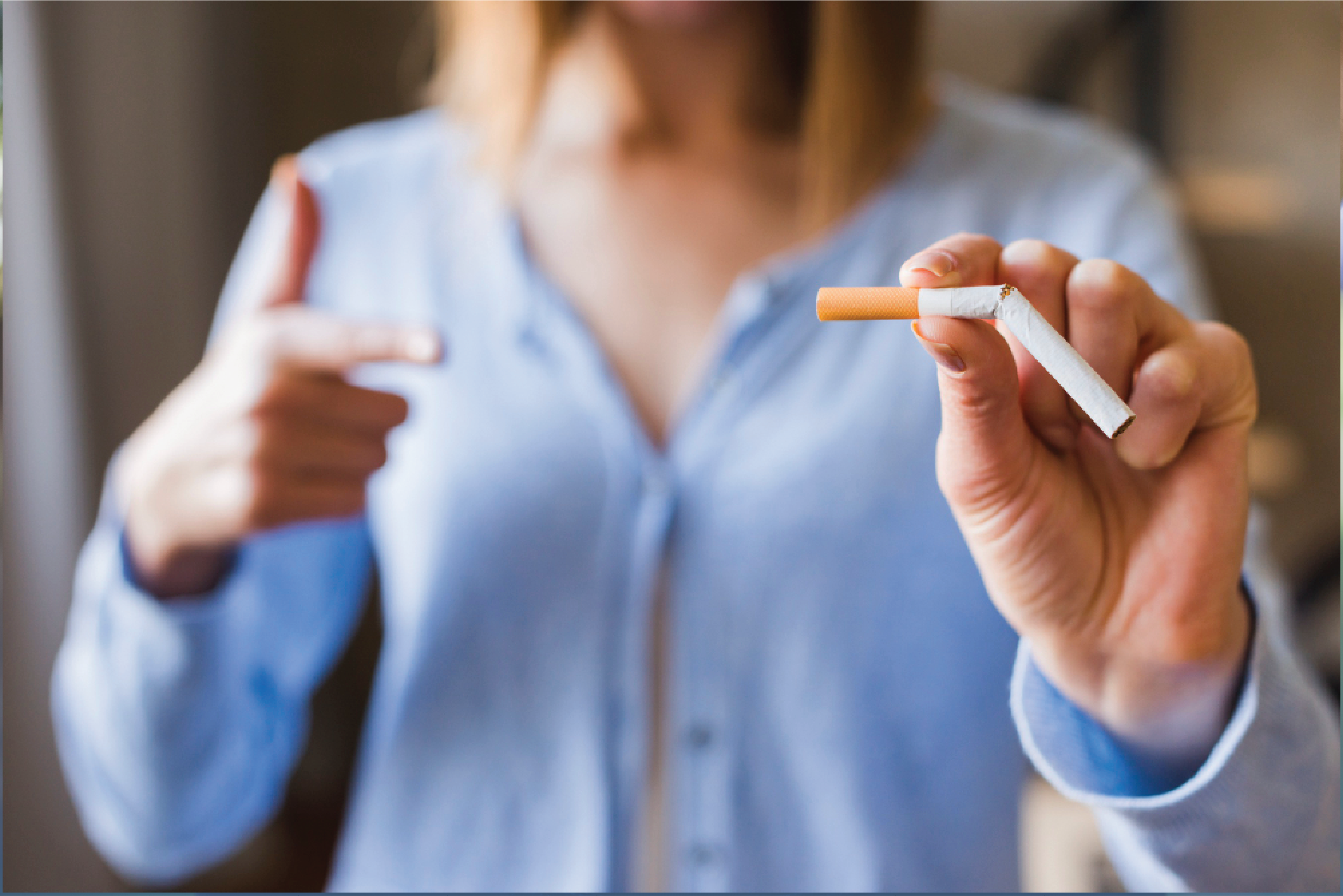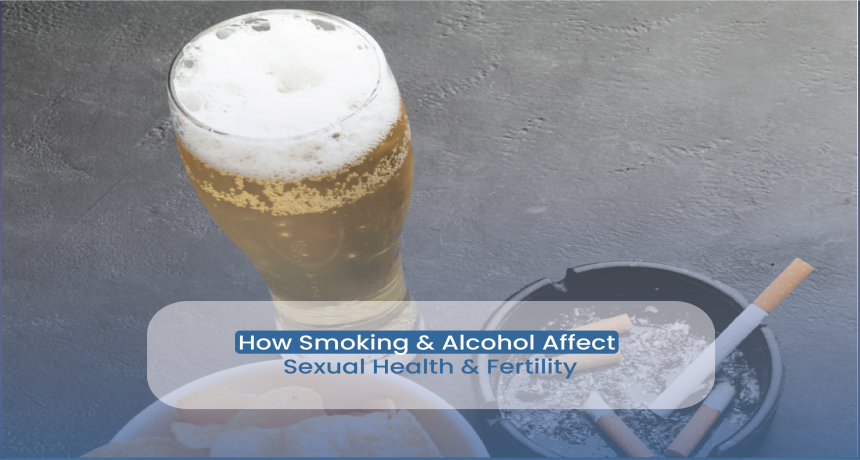How Smoking & Alcohol Affect Sexual Health & Fertility
2025-07-13 Multiple interconnected physical, mental, and lifestyle factors can influence sexual health and fertility. Smoking and drinking excessive amounts of alcohol are two of the most detrimental lifestyle factors for men and women! We already know that they both adversely affect your health, but they could also complicate sexual performance, reproductive ability, and intimacy in many other ways. In this blog, we will deeply examine how smoking and sexual health are connected, share some of the science behind it, and discuss what lifestyle tweaks can have real, positive impacts. One of the most well-studied effects of smoking on males is erectile dysfunction (ED), the inability to get or maintain an erection that is sufficient for sex. First, nicotine and other toxicants in cigarettes cause vasoconstriction, or narrowing of blood vessels, which reduces blood flow. Erections occur via adequate blood flow, and smoking damages the specialized lining of blood vessels and reduces nitric oxide, which is a molecule that helps blood vessels relax and thus enhances blood flow. People often get worried about fact that if smoking cause ED or not; Several studies have found that male smokers are more likely to have ED than their non-smoking peers, and the chance increases with the number of cigarettes smoked. Smoking lowers testosterone levels in men and estrogen in women, the two important hormones for healthy sexual desire. Smoking increases stress hormones, including cortisol which can reduce libido and mood. Women who smoke often have lower lubrication, take longer to orgasm, and have lower sexual satisfaction than non-smokers, which makes sexual experiences less pleasurable. How smoking affects sperm quality in a multitude of ways: Low sperm count Low sperm motility (movement) Abnormal sperm morphology (shape) Fragmentation of sperm DNA causes poor embryo development These impairments can lower a man's chances of conceiving naturally, as well as the chances of success with assisted reproductive technologies such as IVF. Smoking can cause damage to female fertility in many ways: Eggs and reproductive organs in women cause women to lose their eggs faster. Going through early menopause Lowers the success rates of fertility procedures Increases the chance of ectopic pregnancy, miscarriage, and birth defects. Toxins in cigarettes affect the uterine cavity and fallopian tubes, impacting the chances of fertilization and implantation. While alcohol no doubt reduces inhibitions and sexual arousal at first, too much decreases sexual functioning, thus decreasing performance. Alcohol and sexual performance go going in each other: Delayed ejaculation and/or inability to ejaculate. Temporary erectile dysfunction. Decreased genital sensitivity. Long-term heavy drinking will result in ED becoming permanent, normally due to liver issues or a combination of hormonal (lowered testosterone), nerve damage, and cardiovascular issues (all of which are important in sexual functioning). Mild to moderate alcohol use may increase arousal, but over time will dull sexual desire in both men and women. Chronic excessive alcohol use alters hormones and brain chemicals that affect sexual desire, causing: Low testosterone (men). Erratic menstrual cycles (women). Less lubrication and painful intercourse (women). In conclusion, what began as a confidence booster can quickly become a sexual roadblock without some sort of rehabilitation or treatment. While alcohol may relieve inhibitions and increase sexual arousal in the short term, too much of it will negatively affect sexual functioning, thus hindering sexual performance. Some of the short-term effects of alcohol on sexual performance include: Delayed ejaculation and/or inability to ejaculate. Temporary erectile dysfunction. Reduced sensitivity in the genital regions. Having chronic heavy alcohol dependence will mean the temporary erectile dysfunction will become permanent due to liver damage or a combination of hormonal (low testosterone), nerve damage, and cardiovascular problems (noting that these factors are all important for sexual functioning). Mild to moderate alcohol consumption can increase sexual arousal, but will eventually dull sexual desire in both men and women. The good news is that quitting smoking and limiting alcohol consumption can result in reversing most of the damage over time and improving sexual health and fertility. Within weeks or months of quitting, men will see many improvements in their sexual health: Significantly stronger and more consistent erections. More stamina and energy. Increased libido and confidence. Improved sperm quality (there is no more than 3 months - the time it takes to regenerate all sperm) Women who quit smoking report improved menstrual health, improved lubrication, and higher fertility; fertility improves a lot in the first few months of quitting smoking. Cutting down or quitting alcohol will lead to better hormonal regulation, mood and energy, and sexual functionality. Men's sperm quality can improve in as little as 3 months, and women's cycles can return to normal. If you are hoping to conceive, it is best if both partners can abstain from alcohol completely for optimal results. Here are some key steps you can take to increase your sexual well-being and reproductive health: You can utilize nicotine replacement therapy, counseling, and drugs where needed. If you have a partner, they can also help. Having the support of your healthcare provider will also help. If at all possible, I would suggest avoiding alcohol altogether if trying to conceive. You should aim to partake in moderate drinking, which is no more than 1 drink for women and 2 for men daily. Eat foods with antioxidants, zinc, folic acid, omega-3s, vitamins like C, E, and D, which all aid in hormone production, egg and sperm health, and provide energy and vitality. Exercise has many benefits: increases blood flow, reduces stress, increases energy, and helps balance hormones - all of which are important for a healthy sex life and fertility. Some stress is a normal part of life; however, living with ongoing stress may hurt your libido, lead to hormone imbalance, or reduce your fertility. Use techniques like yoga, mindfulness, attending therapy, meditation, hobbies, or anything else to keep your stress to a minimum. Poor sleep may lower your testosterone levels, running low testosterone may reduce libido, and may impact fertility. Aim for a good 7-9 hours. Other drugs like marijuana, highly addictive drugs, anabolic steroids, etc., may also affect your sexual and reproductive health. Avoid these altogether, or be sure to seek help if you feel you need assistance to stop using them. Smoking and alcohol misuse are two of the biggest lifestyle foes to sexual performance and fertility. They have an impact on hormone levels, blood flow, reproductive organs, and mental well-being, which often result in lower libido, erectile dysfunction, lower quality sperm and eggs, and impotence. The good news...? These effects are often reversible, and by quitting smoking, reducing alcohol intake, and becoming more active, all men and women can improve their sexual health and have a better opportunity to conceive. If you’re trying to improve your sex life, trying to get pregnant, or simply trying to be healthier, there is no better day than today to visit our sexual health clinic in Delhi and improve your sexual health and the quality of your life.Smoking and Sexual Health
1. Smoking and Erectile Dysfunction (ED)
So how does that happen?
Smoking and Libido
Smoking and Fertility

1. Effects on Male Fertility
2. Effects on Female Fertility
Alcohol and Sexual Performance

1. Alcohol and Erectile Functioning
2. Alcohol and Libido
Alcohol and Fertility
1. Alcohol and Erectile Functioning
2. Alcohol and Libido
The Power of Quitting: How Your Sex Life Improves

1. Benefits of Quitting Smoking
2. Benefits of reducing alcohol
Lifestyle Changes for Better Sexual Health & Fertility

1. Stop Smoking
2. Cut Back on Alcohol or Avoid it
3. A Balanced Diet
4. Exercise Regularly
5. Reduce Stress
6. Get Enough Sleep
7. Avoid using illicit Drugs
Conclusion
.png)















